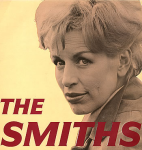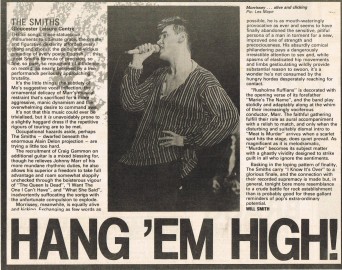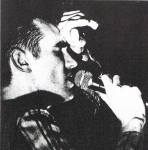1986:
October-December
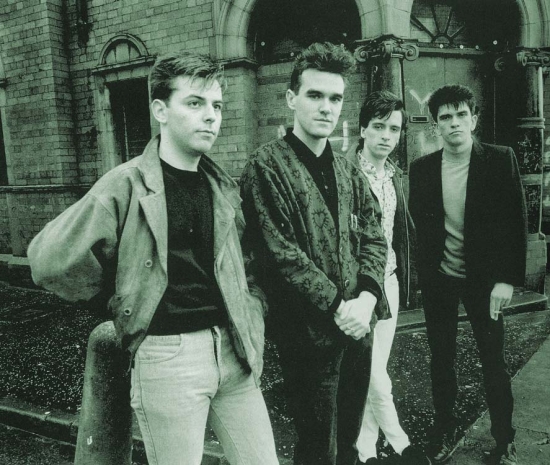
Posing outside the Salford Lad's Club
Photo of The Smiths by Steven Wright. Reproduced without permission.
ARTICLE
This article was originally published in the October 9, 1986 issue of Rolling Stone.
Keeping Up With the Smiths
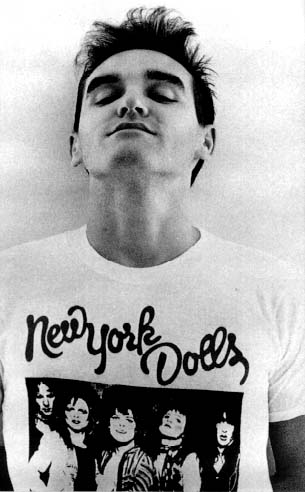
by David Fricke
The British group has spawned a new generation of evocative rock bands
Steven Morrissey, the bookish-looking beanstalk who sings with the British rock group the Smiths, was thirteen when he fell in love for the first time - with the New York Dolls. He saw the band on British television in the early Seventies and immediately flipped for those five glitter-rock hoodlums from the bowels of Manhattan. In his home town of Manchester, England, young Morrissey would wear Dolls T-shirts to track-and-field practice despite the merciless razzing of school bullies. He collected every press clipping on the band, eventually publishing a book of them in 1981. Finally, in 1982, Morrissey put his love of the Dolls' vibrant outrage into action; he formed the Smiths with a local guitarist named Johnny Marr.
With their homely appearance, Marr's Byrds-abilly jangle and Morrissey's wistful, introspective lyrics, the Smiths look and sound nothing like the singer's beloved sex-mad Dolls. Indeed, Morrissey himself has been an avowed celibate these past seven years. But as he gazes thoughtfully at the torrential rain outside his hotel window the day after a recent sold-out concert in New York, the twenty-seven-year-old singer tries to explain how much his plain-Jane Smiths - one of Britain's top postpunk bands, now on the U.S. charts with their fourth LP, The Queen Is Dead - have in common with a bunch of hitless Seventies glam rockers.
"For me, they were the official end of the Sixties," he says, tugging proudly at the faded, old Dolls T-shirt he's wearing. "They were the first sign that there was change, that someone was going to kick through and get rid of all the nonsense. It gave people hope."
The Smiths, in turn, burst unexpectedly onto the British scene in the summer of 1983 like a breath of fresh guitar air amid the preprogrammed ticktock of the Human League and punk's rage by numbers. Compelling singles like "This Charming Man" and "How Soon Is Now?" (with its funeral Bo Diddley drone) went Top Thirty in England; the Smiths' 1985 album Meat Is Murder entered the British charts at Number One. The group - Morrissey, Marr, bassist Andy Rourke, drummer Mike Joyce and new second guitarist Craig Gannon, lately of Aztec Camera - has also left in its wake a new U.K. generation of bands like James, the Woodentops and Easterhouse that play evocative but distinctly nonphallic rock & roll.
"Obviously, it's a different time," Morrissey notes of the Smiths' spiritual link with the Dolls. "But it's the same, in that you can feel that danger."
On The Queen Is Dead, Morrissey sounds the alarm not with a bang but an urgent whisper. As a lyricist, he is more like Ray Davies than Joe Strummer in his tortured poignance and quiet sarcasm. In the title track, he writes twin epitaphs for England's fading glory and the country's impotent royalty, and then, over a jolly music-hall gait, he tells his boss to take this job and shove it in "Frankly, Mr. Shankly." In comparison, the Smiths' latest British single, a strident protest against soulless pop called "Panic," is practically a declaration of war ("Burn down the disco/Hang the blessed DJ/Because the music that they constantly play/It says nothing to me about my life").
"Many people judge the Smiths as being absolutely dour in their approach," Morrissey says with the air of an irritated college professor, adjusting his offstage glasses (he is nearsighted). "But I like to feel that whatever assessments people make of the Smiths, the Smiths speak absolutely for now, singing about the way people live as opposed to the way people don't live, which seems to be the cast iron mode of songwriting these days. We live in a world which is unlike the way Top Forty records convey it."
The Smiths experience, he suggests, is actually "like consciousness-raising classes. They're very depressing. 'Why should we sit around and all talk about our innermost feelings?' But those little things bring people together. They allow people to open and blossom, to learn things about themselves. That's what the Smiths aim to achieve."
For Morrissey (he goes only by his surname), first bloom came in 1965 when he bought his first record, "Come and Stay with Me," by Marianne Faithfull. He was six years old. After that, he avidly consumed Sixties British pop singles "because it was very street level. You knew a group came from Liverpool because of what they were singing." He also devoured pithy romantic hits by female singers like Cilla Black, the Marvelettes and Sandie Shaw (who returned the compliment two years ago by covering the Smiths' own "Hand In Glove").
"To me, the two-minute-ten-second single was power," says Morrissey. "It was blunt, to the point." Yet until his midtwenties Morrissey marveled at that power only in private. The son of a security guard and a librarian, now divorced, Morrissey lived a hermitic existence in Manchester, drawing unemployment, reading Oscar Wilde and writing mostly for his own satisfaction, until Johnny Marr literally appeared at Morrissey's door with his guitar one day in '82. "He had heard of me, of this strange literary recluse," Morrissey laughs. "He was curious."
With local acquaintances Andy Rourke and Mike Joyce, Marr already had the makings of a band. Morrissey had the words and the voice, a tremulous choirboy's cry. After playing only seven shows together, the Smiths had a record contract with Rough Trade Records, a top British independent label. Just as quickly, Morrissey's celibacy and the ambiguous sexual point of view in his lyrics became a major issue in the press. BBC Radio, for example, refused to broadcast the song "Reel Around the Fountain" after British tabloids claimed it was about child molesting. In fact, Morrissey explains with some annoyance, the song was about "loss of innocence, that until one has a physical commitment with another person, there's something childlike about the soul."
Morrissey claims the lack of specific boy-girl (or even boy-boy, girl-girl) references in his lyrics is quite deliberate. "It was very important for me to try and write for everybody." Yet there is an implicit erotic quality to Smiths records, due in large part to Johnny Marr's inventive folk-rock guitar figures, that is quite different from the explicit sexuality of most top pop platters. "I find when people and things are entirely revealed in an obvious way," Morrissey says, "it freezes the imagination of the observer. There is nothing to probe for, nothing to dwell on or try and unravel. With the Smiths, nothing is ever open and shut."
A growing number of young Americans have apparently been patiently decoding Morrissey's lyric messages. Despite an ill-starred American debut on New Year's Eve 1983 - Morrissey fell off the stage of a New York club during the first number - the Smiths have been welcomed on their 1985 and 1986 tours of the United States by sold-out houses and adulatory stage invasions. Morrissey also believes, quite earnestly, that his words and the Smiths' singular music can change a few lives in the same way the New York Dolls changed his. If he was a confused, tortured teenager hearing "Panic" for the first time, he says, laughing, "I would burn down a disco, I'd probably assassinate the queen, and I would definitely form a group called the Joneses."
Reprinted WITHOUT PERMISSION for non-profit use only. Photo of Morrissey by Joe Novark. Reproduced without permission.
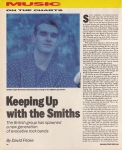
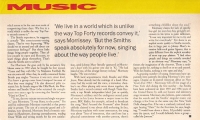
Click to enlarge original pages
SINGLE REVIEWS
ASK - released October 1986
"The guitars fill my head with a rising, golden bliss that never peaks or bursts. And then - major shock, this - enter Morrissey with something approaching a pro-sex statement: 'If there's something you'd like to try/Ask me/I won't say no/How could I?', although 'If it's not love/It's the bond that will bring us together' (sic) must be the chastest plea to be molested ever. 'Nature is a language/Can't you read it? (sic)' How is it that so many can be so fascinated by the state of one man's, er, physical being? With its chugging beat and Kirsty McColl harmonies, this is perhaps their closest approach to commercial lusciousness. I prefer their moments of reproachful, avenging misery myself, like 'How Soon Is Now' - this is a little unfraught, a bit too sunny. But then, as someone who can be brought to tears by 'The Queen Is Dead', I'm beyond impartiality and detachment. Pop has always been about such infatuated, mad allegiance. 'Ask' is unavoidably Single Of The Week. Out in a fortnight."
Simon Reynolds
Melody Maker, October 11, 1986
Reprinted WITHOUT PERMISSION for non-profit use only.
See the original review here
"No, Morrissey, you tell me. I've never been able to figure out why you and your merry men did so well. 'Ask', your latest, hovers reasonably, but when it dissolves into silence, why is there no feeling of warmth left behind, nothing to let me know that I've spent a couple of minutes in your presence? I think Smiths records are lonely places to be. I'm not frightened or impressed by the solitude they conjure up, just bored."
Unknown reviewer
Sounds, October 11, 1986
Reprinted WITHOUT PERMISSION for non-profit use only.
SEE ALSO: NME review
Morrissey on...

'Ask'
"It was quite crucial to release a single that was a slight antidote to 'Panic', because if the next single had been a slight protest, regardless of the merits of the actual song, people would say, 'Here we go again.' That's why we put out 'Ask'. The idea there is... Well, restraint is a decent thing really, but it's nice to throw caution to the wind as well - to jump in at the deep end."
- Record Mirror, February 14, 1987
NEWS ITEM
The Smiths sign to EMI
Despite every effort to hang on to The Smiths by Rough Trade - which even included the staff forgoing wage rises at one point - Morrissey's men have finally succumbed to the lure of the majors, signing to EMI whose financial backing (from sales of weapons, among other things) will hopefully enable the band to fulfil their aspirations.
In fact, The Smiths still have one more album to go under the terms of their Rough Trade contract and at first it was assumed that EMI would simply "buy" the album off Rough Trade.
But despite financial constraints which have reporedly forced Rough Trade into such ideologically dubious practices as hiring staff on YOP schemes and firing them when the grants expired, they show evey sign of resisting EMI's blank cheque and sticking to their principles as well as one more album from The Smiths.
An educated guess would suggest this item originally appeared in Sounds.
Reprinted WITHOUT PERMISSION for non-profit use only.
LIVE REVIEWS
Carlisle Sands Centre - October 13, 1986
'The Queen Is Dead' tour (second UK leg)
"The more I see, the more I'm convinced of two things. The first is that the Smiths are probably the best band in Britain. The second is that they are, slowly but surely, turning into the Rolling Stones. This is not as daft as it may sound - think not of the Rolling Stones of today, the flabby, flatulent, dried out and dried up Stones. Think rather of old film of them - very old stuff - and you'll see what I mean.
It is the unlikely brooding sexuality and skittish posturing of the Morrissey/Jagger figure and the now unashamed 'axe-hero' stance of Johnny Marr - the new Keith Richards.
The second the Smiths take the stage, Carlisle Sands comes to the kind of life it really mustn't see that often. Arriving to their now traditional grand eloquent entrance music and straight into 'The Queen Is Dead', the Smiths are on fine form.
And Morrissey certainly likes his props these days, his 'Queen Is Dead' sign quickly followed by a noose dangled throughout their chart smash 'Panic'. Throughout, Johnny Marr's is an almost entirely conventional 'rock' stance - nothing wrong with that - and he strikes quite a dapper figure up there, a latter day Hank Marvin.
Belting them out from the start, from 'His Latest Flame', 'Rusholme Ruffians', through to the new single, 'Ask', the pacing of the set is most peculiar. After a half hour of maintained 'up' Smithsongs, they swiftly go to a heavily subdued patch which lasts the rest of the set. With 'That Joke Isn't Funny Anymore', 'Cemetery Gates' and the incredibly powerful 'Meat Is Murder' bathed in red and guilt and ending with 'I Know It's Over', the main set ends on a very 'down' beat. It's only with the encores that the pace gets going again.
After their first encore and the slightly misjudged raising of the houselights, a second encore of 'Still Ill' and 'Big Mouth' heralds a stage invasion of major proportions, which is probably the nearest Carlisle has ever come to a full scale riot, but all harmless fun.
There is no doubt about it, the Smiths are in a virtually unassailable position. It remains the juxtaposition of Morrissey and Marr that makes the band (and undoubtably will break them too), but now is their moment - and they should make the most of it. The Queen is dead, long live the King."
Dave Sexton
Record Mirror
Reprinted WITHOUT PERMISSION for non-profit use only.
See the original item here
Gloucester Leisure Centre - October 18, 1986
"THESE songs, these statuesque monuments to ultimate grace, the ornate and figurative dexterity afforded every chord and chorus, the pride and vicious prejudice of every poetic flourish ... this great Smiths formula of precision, so fine, so pure, so repugnant of diffidence on record, so nearly betrayed by a live performance perilously approaching brutality.
It's the little things, the subtlety of Mo's suggestive vocal inflection, the ornamental delicacy of Marr's musical restraint that's sacrificed for a more aggressive, manic dynamism and the overwhelming desire to command awe.
It's not that this music could ever be trivialised, but it is unavoidably prone to a slightly haggard dress if the repetitive rigours of touring are to be met.
Occupational hazards aside, perhaps The Smiths - dwarfed beneath the enormous Alain Delon projection - are trying a little too hard.
The recruitment of Craig Gammon (sic) on additional guitar is a mixed blessing for, though he relieves Johnny Marr of his more mundane rhythmic duties, he also allows his superior a freedom to take full advantage and roam somewhat sloppily unchecked through the boisterous vigour of "The Queen Is Dead", "I Want The One I Can't Have", and "What She Said", inadvertently suffocating the songs with the unfortunate compulsion to explode.
Morrissey, meanwhile, is equally alive and kicking. Exchanging as few words as possible, he is as mouth-wateringly provocative as ever and seems to have finally abandoned the sensitive, pitiful persona of a man in torment for a new, improved one of strength and precociousness. His absurdly comical philandering pays a dangerously irresistible attention to sex and, while spasms of elasticated hip movements and limbs gesticulating wildly provide substantial reason to swoon, it's a wonder he's not consumed by the hungry hordes desperately reaching for contact.
"Rusholme Ruffians" is decorated with the opening verse of its forefather "Marie's The Name", and the band play stolidly and adaptably along at the whim of their increasingly vociferous conductor, Marr. The faithful gathering fulfil their role as aural accompaniment with a relish to match, and only when the disturbing and suitably dismal intro to "Meat Is Murder" arrives when a scarlet spot hits the stage, does quiet prevail. As magnificent as it is melodramatic, "Murder" becomes its subject matter with a ghastly vividity designed to strike guilt in all who ignore the sentiments.
Basking in the loping pattern of finality, The Smiths carry "I Know It's Over" to a glorious finale, and the connection with their recorded supremacy is made but, in general, tonight bore more resemblance to a crude battle for rock establishment than is probably good for these gallant reminders of pop's extraordinary potential."
Will Smith
Melody Maker
Reprinted WITHOUT PERMISSION for non-profit use only.
Morrissey and Marr onstage at the London Palladium, October 26, 1986
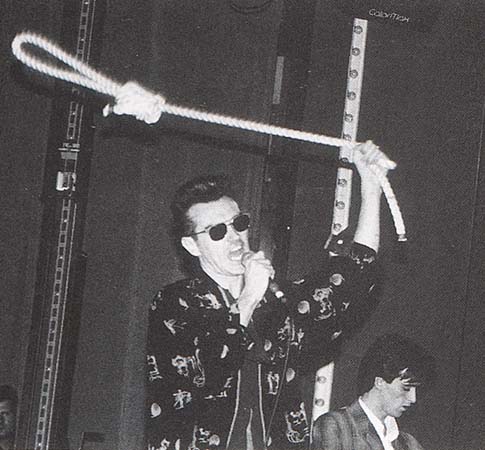
The following three items review The Smiths live at the London Palladium.
HATFUL OF HOLLOW
"WOT, NO roundabout? Apparently not. Just because The Smiths were playing Sunday night at the London Palladium, it didn't mean they were going to make an occasion of it. This was a gig like those at the Kilburn National and the Brixton Academy before it. And like the whole tour before that.
In fact, the gig started back in America where they've finally decided to give it a crack. The grandiose operatic aria followed by the classical anthem and bright lights dazzling the audience gave way to a blistering version of 'The Queen Is Dead' with Morrissey waving a placard like a demented demonstrator and Johnny Marr burning his midnight lamp on the wah-wah pedel.
'Panic' followed instantly, Morrissey twirling a noose as he sang "hang the DJ". But then The Smiths don't need a DJ; they're quite capable of plugging the entire 'The Queen Is Dead' album by themselves.
Which is what they proceeded to do. But as they did so, the alacrity gradually waned and the blue and green lights took on the same murky hue as the sound, which often rendered Morrissey's voice inaudible. You could hear him growl, though.
Occasionally, they delved back into 'Meat Is Murder' for the title track and 'Rusholme Ruffians'. There was a new song too, called 'Is It Really So' (sic), but none of them added much contrast. That only happened when Johnny Marr stopped trying to compete with his newly acquired rhythm guitarist, Craig Gammon (sic), and played like the lead guitarist he should be.
Morrissey managed to pierce the dense sound on 'The Boy With The Thorn In His Side' and 'Cemetary Gates' when he overcame his ambivalence sufficiently to start taking off his shirt. Two songs later, he threw the shirt into the crowd and the set was over.
The applause had virtually ceased by the time they came back for four numbers: an instrumental, 'How Soon Is Now', another long break, 'Still Ill' and 'Bigmouth Strikes Again'. These songs were much better. In fact, they should have been in the set. What difference will EMI make?"
Hugh Fielder
Sounds, November 1, 1986
Reprinted WITHOUT PERMISSION for non-profit use only.
See the original review here
VANDALISM BEGINS AT HOME
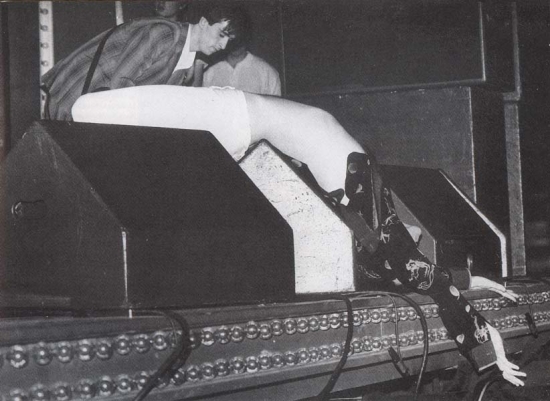
"Alright John we'll do 'Jumping Jack Flash' next" (Original caption)
"IN THE footsteps of such music-hall and variety greats as Tommy Trinder, Ted Ray and Jimmy Tarbuck, tonight The Smiths tread these venerable boards to confront a frothing audience of boys and girls who forego the sedentary comfort of Edwardian plush in favour of a constant, hollering ovation.
Connoisseurs of the only mildly incongruous will also delight in the fact that the other six nights a week (plus matinees), the Palladium stages the musical La Cage Aux Folles. We are thus welcomed to our seats to the strains of George Formby's little ukulele, followed by an appropriately heroic aria from, I do believe, Gluck's opera Orfeo, seguing into the haughty 'March Of The Capulets' from Prokoviev's Romeo and Juliet. A capital 'E' Event beckoned.
The event, it turns out, is Business As Usual, Morrissey's no doubt prescription dark glasses and Marr's cock-height Gibson Les Paul alert me to what's in store. If Johnny Marr is rowdily psyching himself to crack the American Midwest, then Morrissey has learned to growl. Not pretty. Meanwhile, Messrs Joyce, Rourke and Gannon huddle just outside the limelight and put in some overtime.
Militantly brandishing a placard a la Ramones proclaiming 'The Queen Is Dead', Morrissey leads the group through a revamp of the song of that title with an attack that cares little for finer points. And so it goes. Morrissey's camply rock-literate self-mockery shouldn't double-bluff you from the fact that tonight Johnny Marr calls the shots, cheerfully vandalising The Smiths' most distinctive and precious qualities. A momentary perverse enjoyment of such wilful trashing ill-compensates for the pangs of nostalgia and what-might-have-been as Morrissey's voice numbly surfs stadium-high waves of proficient, flashy, sometimes macho rock noise.
A taunting petulance now thrashes Morrissey's lily limbs, as if defying us to recall fond memories of the petal-strewn idiot dancer, the innocent rhapsodist who so brilliantly reclaimed a sensitive, intimate voice from rock's sweatstorm. Now he addresses the middle distance, no longer taking us into his confidence.
"It takes guts to be gentle and kind," he sings in 'I Know It's Over', words rarely heeded by those around, though oddly this song's swollen melodrama saves it. The fulsome, underrated 'The Boy With The Thorn In His Side' likewise survives, as do a beefed-up 'Meat Is Murder' and 'How Soon Is Now', still one of rock's most mysterious and exalted moments. Typical of the evening, however, is 'Ask', whose subtlety on vinyl only clicked with me after five plays. Live, all goes well until that breathtaking mood change of reverie halfway-through, which is trampled underhoof by the band's collective desire not to sound prissy.
On stage, music that at one time made no apologies for ringing melancholy - though its terseness always kept sentimentality at bay - has hardened with the rigours of the road and pressures of career into something slightly coarse, mannered and untrue to itself. I, for one, regret this 'progress'."
Mat Snow
New Musical Express, November 1, 1986
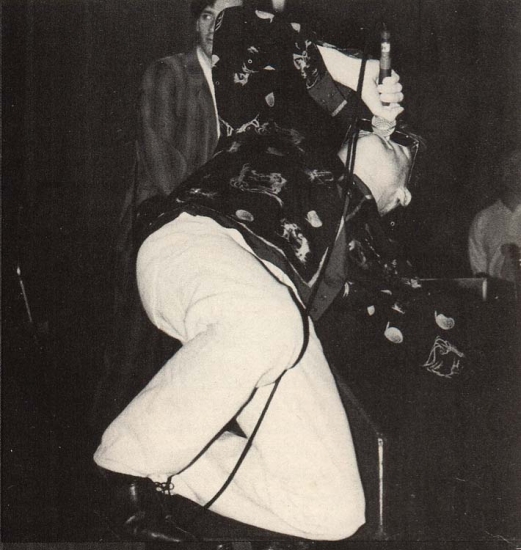
"It's not like the old days anymore" (Original caption)
Reprinted WITHOUT PERMISSION for non-profit use only. Photos by Chris Clunn reproduced without permission.
See the original review here
The London Palladium is the heart of the British entertainment establishment.
The Smiths don't even fit into the British pop establishment.
They took no part in the gathering-together-for-a-good-cause that was Live Aid, and singer Morrissey found himself the most unpopular pop person in the country - along with unlikely bedfellow Jonathon King - when he denounced the event.
So when The Smiths took the stage of the elegant West End theatre, you could be sure that there'd be none of the "it's such a great honour to be here we'd like to thank you all for coming ..." lark.
Instead, whirling a banner that announces 'The Queen Is Dead' (a statement guaranteed to send Fleet Street into a state of righteous indignation), Morrissey launched into the title track of their latest album with just a brief "good evening".
In dark glasses, blazer and white trousers the singer looked more like a refugee from The Style Council than singer with the country's most popular indie group. In fact, members of the audience, with hearing aids and NHS specs looked more like him than he did.
That soon changed when he flung off jacket and shades in order to do that distinctive body-jerking and arm-flailing that passes for dancing. It is a thing much imitated but never equalled.
It's an impressive start, and the next song, the brilliant 'Panic', keeps up the momentum, the prop this time being a noose (to hang the DJ presumably). Morrissey's shirt is already hanging out as he gyrates his hips in that peculiar parody of sexuality he has, but the audience seem strangely subdued. Maybe it's the refined setting, but there's none of the over-the-top enthusiasm that usually goes hand in glove with Smiths concerts.
The pacing of the set doesn't help. Mournful, slow songs like 'I Want The One I Can't Have' and the gorgeous 'There Is A Light That Never Goes Out' are mixed willy nilly with fast, frantic numbers like 'Vicar In A Tutu' and 'Ask' which means there's no sense of building towards a mood or climax.
Still, The Smiths on an off night still knock spots off most other bands. Morrissey's lyrics can make you laugh or cry, and Johnny Marr's guitar compliments each song perfectly.
On the subject of Mr Marr, he's swapped the lovable mop-top-shades-and-jeans for a baggy suited Yuppie style (Yamamoto, natch) which is far less appealing. And he looks like he's become a 60-a-day man, spending half his time enveloped in smoke from an ever-present cigarette hanging out of his mouth. Working with Rolling Stones guitarist Keith Richards can seriously damage your health ...
If the show had suffered from being slightly lacklustre - probably the result of being towards the tail end of American and British tours - that was soon put to rights with the stunning 'It's Over' (sic) with its mournful refrain of 'Mother, I can feel the soil falling over my head ...' And the encore of the psychedelic 'How Soon Is Now' was worth the admission price alone.
Closing with his anthem 'Big Mouth Strikes Again', Morrissey punched his fist proudly in the air, Johnny Marr did a final bit of his drunk-student-still-on-the-dance-floor-at-the-end-of-the-disco gimpy dancing, and they were off.
Past fans bearing flowers outside the stage door Morrissey and his merry men jumped into a waiting limo. There'll be plenty more of those when The Smiths join EMI in the New Year. Some may ask what difference does it make? Probably none - The Smiths will still be the best indie band in the country."
Karen Swayne
No. 1
Reprinted WITHOUT PERMISSION for non-profit use only. Photo by Chris Clunn. Reproduced without permission for non-profit use only.
See the original review here
NEWS ITEMS
Disturbances at Smiths gigs
The following news item originally appeared in the October 25, 1986 issue of New Musical Express.
PANIC IN THE SEATS OF NEWPORT
SIX PEOPLE were arrested following The Smiths concert at Newport Leisure Centre on Sunday night, during which Morrissey was pulled off stage and the group's sound engineer was hit by a bottle thrown from the crowd.
Morrissey received a black eye after hitting his head on the floor but was rescued by security staff and treated by a doctor. When sound engineer Grant Showbiz announced the gig would not go on he was struck on the head by a bottle and had to be taken to hospital to be treated for cuts and concussion.
"One element of the crowd was raucous throughout and kept spitting at the group," said a Smiths spokesperson. When Morrissey was dancing at the edge of the stage, somebody grabbed his hand and he lost his balance. The crowd parted and he hit the floor headfirst.
"They were already 40 minutes into the set when it happened so the show was nearly over anyway. Morrissey wanted to carry on but the doctor thought it would be better for him to rest. The rest of the tour will not be affected.
"Some members of the audience were not pleased and started ripping up the seats and the police were called. Perhaps if Morrissey had carried on it would not have happened."
Reprinted WITHOUT PERMISSION for non-profit use only.
The following news item probably appeared in Melody Maker in early November 1986.
BIGMOUTH STRUCK AGAIN
THE SMITHS have become the latest victims of concert-hall trouble makers.
In one incident last week, the group had to abandon a gig during the first number after Morrissey was hit by a missile thrown from the crowd. Only a week earlier, he was forced to leave the stage due to an injury which also involved "fans".
The first signs of trouble on The Smiths' recently-completed tour happened at Newport Centre on October 19. The group cut the set short after members of the audience pulled Morrissey offstage where he lost his balance and hit his head. This happened towards the end of the evening, and didn't shorten the show too severely.
However, Rough Trade records believe that the sensationalist reporting of this incident in a national paper encouraged a group of hooligans to turn up looking for trouble at The Smiths' Preston Guildhall concert on October 27.
A spokesman said: "At Preston, Morrissey was hit above the forehead with an object which had been thrown from the crowd. He didn't know what it was, but his head was bleeding and he left the stage. The tour manager said it was a coin. This happened during the first number, 'The Queen Is Dead'."
According to Rough Trade, the bleeding did not stop, and Morrissey tried to have a doctor called to the venue so he could be patched up and the show could continue. He was told, however, that he had to go to the Preston Royal Infirmary. After waiting in casualty for an hour, "he gave up and went back to Manchester".
In Preston, meanwhile, fans are challenging this official explanation.
Alan Bradley, who was in the audience, said: 'They took about an hour to come on after the support band. They went into 'The Queen Is Dead' and someone from the crowd threw a drumstick, not at Morrissey but at Johnny Marr. It hit his guitar and he lost a string. He picked the stick up and threw it back. About a minute after that, the drumstick flew out of the crowd again and hit Morrissey on the left side of his head.
"Many many fans who were at the front saw him get hit with a piece of wood. It's absolute rubbish to say it was a sharpened coin or any other sort of coin."
Rough Trade commented: "There was a drumstick on the stage, but it was the one Johnny Marr uses to hit his guitar strings. Morrissey wasn't hit by a drumstick."
Reprinted WITHOUT PERMISSION for non-profit use only. Photo of Morrissey by unknown photographer. Reproduced without permission.
See the original news items here
For Johnny Marr's reaction to these incidents, see the article Exile On Mainstream
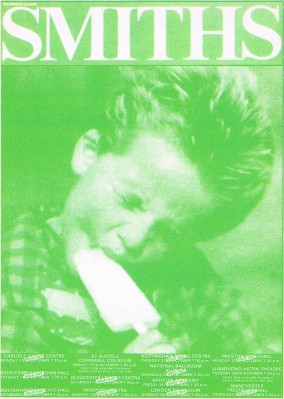
Advertising poster for the second UK leg of 'The Queen Is Dead' tour
